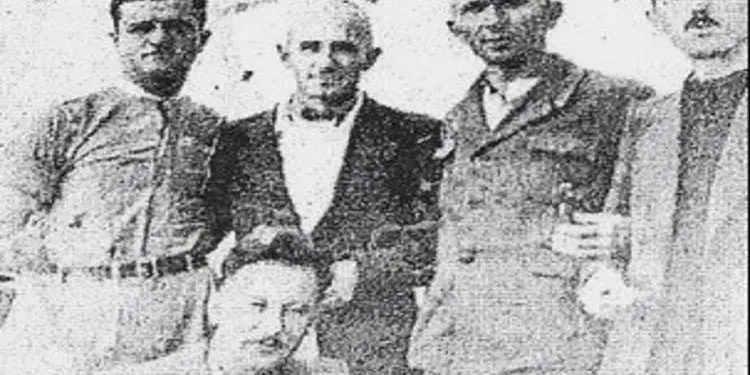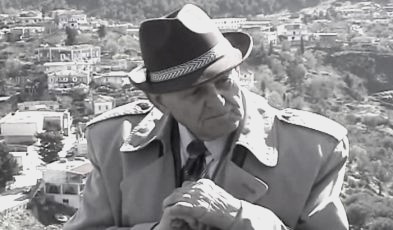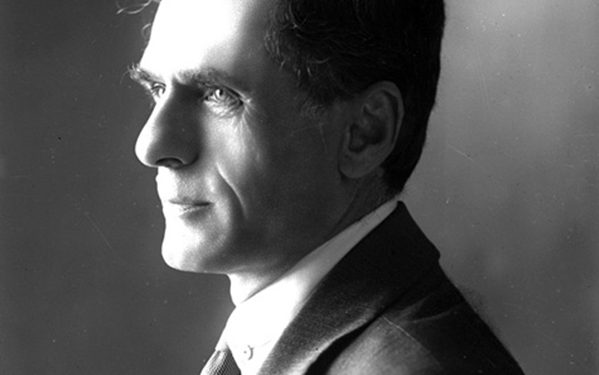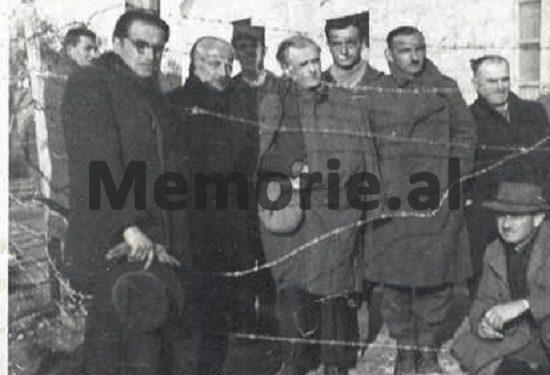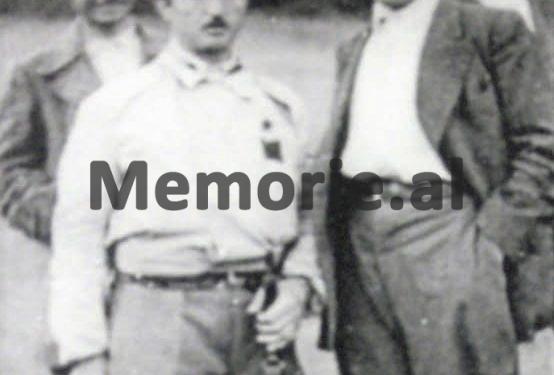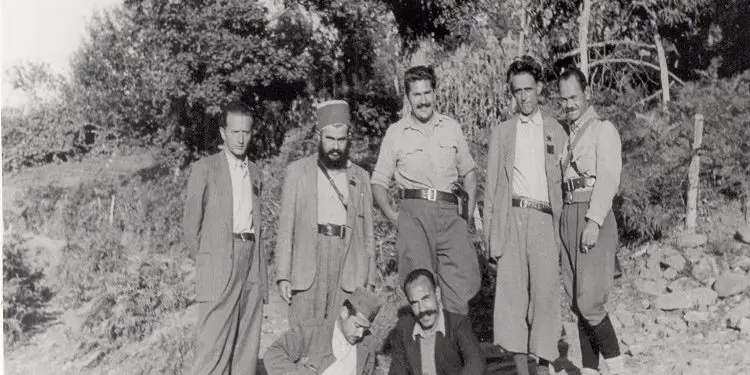By Petrit Velaj
Part Three
Memorie.al / During the years of World War II, the waves of the Anti-Fascist War swept us away without us realizing it. We were schoolmates, like city boys, me, Bajram Tushi, Hajredin Bylyshi, Hiqmet Buzi, Mumin Selami (Kallarat). Amidst the dreams and desires of the romance of literature. With these friends of mine, I have many memories. Our parents, our mothers, honest and generous people. A patriotic mother, mother Tina of Tol Arap, the well-known patriot, gathered us around her like a nest of birds. She was the mother of my childhood friend, whom we called: “the flower of Vlorë youth”, Vllas Arap. I think Mumin Kallarati gave this epithet to Vllas. I associated with every friend and comrade who was honest and sincere.This united us in our society with our peers: Hazis Sharra, Qemal Xhyheri, Xhemil Beqo, etc. Even though our opinions were different, we went together to picnics, play games and go to the cinema. A meeting at Lef Sallata’s house. Suddenly, politicized thoughts erupted in our society. The debate flared up with the young revolutionary, Kastriot Muço. He was an honest man. After four or five days, Kastriot said to me: “Petrit, when are you going to hold the youth meeting in the Çerekçie neighborhood? In the city’s activity, you were elected responsible for the neighborhood youth group”. After a few days, we organized the youth meeting in the “Çerekçie” neighborhood.
Continued from the previous issue
The next day, as soon as dawn broke, my brother, Selahedin, told me: “Petrit, brother, Mr. Mit’hat Frashëri is looking for you, in the upper room of the house. I immediately climbed the wooden stairs. I knocked on the door. As soon as I entered, Mr. Mit’hat greeted me with a smile on his face. He told me: – “You will go to Tirana. There you will meet Medihana, the daughter of Mehdi Frashëri. You will ask her in my name for 650 gold napoleons. We need them for the messenger to take us to Italy.
So, my son, arm yourself and make sure you are well prepared for the journey. You will also go and meet Professor Nexhat Peshkëpi and tell him that I expect them to come here together with Doctor Haxhi Musa from Elbasan”. I was glad because these were also friends of our family. As Selahedin advised me, I did not set off by car, but took the bus on the Shkodër-Tirana line.
In Milot I meet Abas Ermenji, after the bus stopped us at the signal given by their vanguard. There, two days earlier, there had been a clash with the Germans. The forces of the “Ball Kombëtar”, commanded by Abaz Ermenji, had burned 12 German cars; people had been killed on both sides. Abaz was so upset by the killing of his fighters that he barely recognized me.
Professor Abaz had stayed for two weeks during 1944, in our house, in Ujët e Ftohtë. He told me about the clash. I told him about the messages of Mit’hat Frashëri and we separated. Near the village of Mamurras, we encountered an ambush. The road was blocked by trees and oak trunks. It was impossible to pass. Meanwhile, from the surrounding hills, volleys of weapons, they shot at us with machine guns. They were partisans stationed in the hills of Albulena, near Mamurras.
Isak Metua from Mesaplik was also on the bus, along with Ejup Zoto from Ramica. Since I had a letter from Mit’hat Frashëri, I did not surrender. I responded to their gunfire with my revolver. There, on the walls of Prek Previz’s house, I dug a hole in a line and put the letter inside. I went to the walls of the house, where I encountered partisan forces again. I knew one of them.
It was Vangjel Kolea. They tied me up and took me to the headquarters of the XXIII Partisan Brigade. The commander of this brigade was Hamit Keçi and Commissar Xhavit Qesja. They took me to a barracks, shot me and demanded to know my mission. After a few days, they sentenced me to be shot. Early in the morning, on November 2, 1944, they brought me before a firing squad. In front of me were the partisans of the XXIII Brigade.
They read me the verdict: “death sentence”. But, at the moment the squad was about to receive the order to fire, Professor Mihal Prifti from Dropulli appeared at the turn of the small hill, riding a mule. For me, he remained a messenger from God. As soon as he saw me, he shouted loudly: -“Don’t shoot, boys”! – The commander and the commissar of the brigade, out of respect, stopped giving the order to fire. Mihal Prifti was the commissar of the First Division.
As he approached, he ordered: “Pick him up, I know this boy. He is not one of those who should be shot. He was my student at the Vlora Commercial School. I am from Dropulli. But, it is better to hand him over to Hysni Kapo, so that he can judge him”. He took me with him to the second floor of the house. He told the headquarters guard to speak to the Brigade’s cook. When the cook came, he asked: “Is there any food or bread left?” He replied yes. “Pour some rations here” – he ordered. I had not eaten for 48 hours.
When he saw me eating hungry, we started talking about the hardships of the war, about Ujë e Ftohtë, the Commercial School, of which he had many memories, and about my father, who was a friend of those years. He had spent some time at our house in Ujë e Ftohtë, when he was a teacher. He had talked a lot with my father, about the hardships of the city and the national issue. After two hours, he prepared a letter for me to Hysni Kapo. The letter was long.
He put it in an envelope where he wrote: “To Comrade Hysni Kapo, Commissioner of the First Corps. Personally”. We set off through the mountains of Kruja. From Albulena, I was accompanied by a partisan squad with Commander Seit Coku, the brother of the two martyrs. On the way through the cliffs and mountains, he would ask me kindly. When I slept, he would untie my hands, and give me something to eat and drink. In the morning, he would tie me up again to continue the journey.
We arrived at the Dajti mountain slope, in a village among centuries-old chestnut trees, in the hills of Zallherri. That afternoon, when we arrived there, near an old chestnut tree, I saw Dali Ndreu, Liri Gega and Hysni Kapo sitting. As soon as Liri Gega saw us, he asked his companions who I was. After being informed, he ordered: “Why don’t you shoot him? Are you still holding him?” Hearing those words, Hysni Kapo approached me and, seeing me reading Professor Mihal Prifti’s letter, without delay, said to the partisans: “Escort him to the partisan prison.”
We walked along a path and a two-story house appeared in front of us. The prison was on one floor of this village building. It had a large wooden gate, as well as windows like turrets. The door was made of oak. The prison was guarded by armed partisans. They pushed me inside. There were ten or twelve other prisoners there, who for the first few days did not communicate with each other or with me!
There I also saw the gendarmerie lieutenant, Tasin Spahiu, whom I knew since the battle of Selenica. I asked him: “Why are you here?” He replied that; Muharrem Bajraktari had sent him as a delegate to talk to the partisan forces, which were commanded by Hito Çako, but he had arrested him and ended up there. Tasin only said: “They betrayed me, you men”! In this kind of prison, I stayed for over fifteen days. Various partisans came and visited us.
One day, doctor captain Ibrahim Dervishi came to us. As soon as he saw me, he started talking loudly: “Ah, you sons of Ahmet Velo, you took the path of ‘Balli’… “! I could not bear his insults and curses, and I answered him on the spot: “We are fighting for Albania, for Kosovo and Chameria, Mr. Brahim, and not to sell the country, as your father and Idai Mufti did in 1920. Neither our father nor we his sons have treason and espionage as our lineage…”!
He began angrily, as he was wont to talk nonsense, but I told him coolly: “Doctor, you look at people from the point of view of their physical illnesses, because I don’t know much about that either, but I know better about their mental illnesses than you…”! He left, insulted. The other prisoners burst into laughter. Not even two days had passed when a tall, thin partisan came and called me to the prison door. I got up and went out into a meadow. My childhood friend, Daut Hasani, was looking for me.
He welcomed me warmly. After we talked for a while, he accompanied me to Hysni Kapua. It was afternoon. Under the shade of the large chestnut tree, were sitting: Hysni Kapo, Dali Ndreu, Liri Gega, Bako Dervishi and Vehbi Hoxha. They greeted me warmly, with the exception of Liri Gega, who, as soon as she saw me, turned dark like the clouds over Mount Dajti. Hysni Kapua spoke at length about me, about my family, the patriotism we had shown. The others also approved of Hysni’s words. Only Liri Gega demanded at all costs that I be executed. While they were judging me, they brought in a German officer, no more than 22-23 years old.
After being tried on the charge of “Gestapo officer” he was sentenced to death. Liri Gega ordered the grave to be dug himself. She came around several times and, due to her allergy, before the German had finished digging the grave two palms deep, she ordered the firing squad, blindfolded him with a handkerchief and told them to shoot. The German understood that he was going to be killed, so he turned towards them, saying in German: “Shoot me”. Under the German’s shouts; “Go Hitler”, the firing squad retreated over him.
But his body was still not dead; it was in the middle of its last convulsions. Taking advantage of the close friendship with Daut Hasani, I took the revolver from his belt and went and gave him the last bullet. I could not look at him in that state. Hysni Kapua, this gesture of mine was received very well. The others too. Only she, the “black panther”, remained sullen. After those scenes, in the evening, Hysni Kapua and Bako Dervishi, old friends of our family, took me.
We talked for about two hours. Each in his own positions of opinion. At the end of the conversation, Hysni Kapua tells me that; “We thought that you, Petrit, would become a teacher for the battalions of the First Corps. The battalions where I was concentrated had a commander, a young man from Tërbaçi in Vlorë, Fiqeret Mersini, and a commissar, Daut Hasani, from Mesaplik. After a few days, the First Corps moved to Tufina, a village near Tirana. I became even more friends with Fiqret Mersini and Daut Hasani.
One night it was my turn to be in the bodyguard of the Corps Headquarters in Tufina. The members of the Headquarters, Hysni Kapo, Tuk Jakova, Liri Gega, etc., were lying in a large room and were sleeping. I took the bodyguard service from ten o’clock in the evening until six in the morning. Then, at two o’clock, after midnight, the phone rang. It was Mehmet Shehu’s voice. He asked the First Division to send me to the front line with the Germans, in the liberation of Tirana, two hundred chosen boys.
As soon as I received the notification, I went to the room, woke up Hysni Kapo and transmitted the notification to him. At this time, Liri Gega heard my voice and said to me: “Where is the commander of the bodyguard, Fiqret Mersini”? I told her that the commander was sick with a stomachache. – “He has had a fever for over two hours and has hid somewhere to calm down.” However, she did not believe my words. I saw her talking to herself, like a whining mumble, and she went back to sleep on the other side.
I went outside, went down the wooden stairs of the building and in the darkness, asking the other partisans, I found the commander in a straw hut, near some trees. I told him the incident and the phone call that Mehmet Shehu had made. I went back to the bodyguard. I pondered the questions that the “black heart” had asked me; and what I expected happened: The next day, even though I was sleepless from bodyguard duty, Liri Gega called me and asked me over twenty questions. I also faced Fiqret. He was honest with me and himself.
The next day a new organization of the partisan forces took place. I went straight to Hysni Kapua and told him that I wanted to be among those two hundred people who would go to the front line, in the battle of Tirana. He hesitated for a moment and did not answer me. When I saw the situation like this, I also joined the ranks of the partisans. We set off for the front. The first line of the front began at the former “Partizani” Cinema, “Elbasani” Street, the Sauk Hills, up to today’s train station. That night in the trenches, we fought selflessly against the Germans.
The front moved forward a lot. On my side, all the Germans retreated from their positions. This also became support for the line of attack. Near morning, an officer came to my position and asked me: “What is your name”? I told him my name; Petrit Velaj. He handed me a small piece of paper on which he wrote my name. I read; “non-commissioned officer”. Then I heard his words as if through the wind: “For the bravery you showed during the fighting, we are promoting you”. – “Thank you, I told him”. For two more days and nights, we stayed in positions.
The day after tomorrow we took up positions at Skanderbeg Square, in the center of Tirana, where the large bunker was. While attacking that day, I escaped many hails of bullets. A plague shell came and hit me where I was. A partisan spoke to me and as soon as I raised my head, I dodged the blow. After three days we retreated to the battalion headquarters of the Corps. When we woke up one morning, I saw on the battalion stand the ranking of the best fighters who had participated in the battle for the liberation of Tirana.
Among the names of the volunteers, I read my name, which was written in bold letters: “Petrit Velaj, fought with courage and selflessness, in the war of Tirana. For this, he is promoted to officer.” As I was walking towards the headquarters square, as soon as Hysni Kapua saw me, he said to Liri Gegë: “Look, Petriti, he fought bravely. Do you see what an honest man means? I know his family well.” With the entry of the combat forces into Tirana, I was called to the Corps headquarters and employed in the distribution of papers, according to the brigades and battalions.
I was also part of the economic section, where Aleks Verli was in charge. After a few months, it must have been April 1945, with the intervention of Hysni Kapua, I was appointed to escort military fabrics, at the “Jovanović-Popović” factory, in Gërdilica, Yugoslavia, near Leskovac. Working responsibly and accurately, I saw that there were people there who were monitoring me. I had a Servet Karafili, from Kuçi, in charge of that work. As a rear commander, I had a certain Dhimitër Kotini, from Fier, an ambitious and angry man.
I had known him since the Vlora Commercial School. Once, when I was on business in Yugoslavia, I was invited to Belgrade, together with my friends, to attend a meeting. All the Albanian military gathered in a large hall of the General Command of the Yugoslav Army. Also present were the head of the military mission, Vasil Konomi, the Albanian delegate to Paris, Hysni Kapo, and the president of the Albanian Antifascist Women’s Organization, Nexhmije Hoxha.
Since I was near Nexhmije’s arm, at one point, I remember that she asked me: “Who are you and where are you from?” I did not answer immediately…! She understood and turned to Hysni: “Why did you bring this ballist here?” Hysniu, with his calm nature, turns and says: “Nexhmije, Petriti was one of the strong anti-fascists of the city of Vlora and an excellent student of the Commercial School”.
Amidst the noise of the people, I absorbed the words she said in the continuation of the conversation, that; people like me, should not be there. However, when the meeting opened, a lieutenant general spoke and, among other things, said that; Albania will soon be the seventh Republic of Yugoslavia. The speaker finally asked who wanted to speak. I could not stand it and opposed him on the issue of Kosovo. He asked me from the head of the table: “Are you a communist?” I immediately said: “No, I am not a communist, but I am Albanian”.
Then I heard from his mouth, a bunch of insulting words about Albanian nationalism. When I returned to Tirana, I was immediately called to the General Command. I understood immediately, after they escorted me with partisans. Colonel Ibrahim Dervishi came there and arrested me. Then they interrogated me. After a day, they isolated me at Shefki Shatku’s house, at “Selvia” on “Dibra” Street. From there, they escorted me in a car to Vlora.
Prison life, 1945
The car stopped in front of the door of the Vlora prison. I got out. I saw the Vlora sky with some white clouds, which had risen above Karaburun and were being pushed from the Shashica Mountains, towards my beloved village, Kanina. I don’t know why at that moment, the clouds above the Vlora sky seemed to me like white sheep; I don’t know why at that moment I imagined the flocks that were migrating through the Shashica stables. At the Internal Affairs Branch, I was received with arrogance, by Hito Çakua, the head, and Qatip Dervishi, the deputy head of the Internal Affairs Branch. They isolated me in a room at the entrance of the old prison, opposite the City Hall.
The next day, even though I was tired and exhausted, the investigator called me. The portrait of Namik Cakran appeared before me. This man had my aunt’s maid for a wife. During the war, I had heard that Namik Cakran had been captured by the forces of the “National Front”, commanded by his brother, Kujtim Cakrani. Kujtim had his shoulders against the wall of the house in Cakran and had said: “You are sentenced to death”! His father, Bektash Cakrani, immediately intervened and said: “Don’t, my son Kujtim, he is our son”.
Kujtim turned to his father and said: “I didn’t mean to kill him, but I wanted to tell you that if we don’t kill him, he will bite your head off, father”. And this scene came to my mind at that moment when I was facing him, in the interrogation room. Namik Cakran sentenced his father to death, but what about me?! The investigation ended quickly. After two days he came to the investigation together with Ismail Kreshpa. In the questions they asked me, I immediately recognized the cunning and deceitful Namiku, a habit I had in his school years.
In the Vlora prison, I ate with Professor Bego Gjonzeneli. I would also take his clothes and, together with mine, send them home to wash. In my room, at first, I also had Professor Stiliano Gaxho, the best botanist in the country, as well as Tahir Hoxha, Maliq Koshena, Kamber Durmishi, Mustafa Muslymi, Hamdi Gjoni, Axhem Mahmuti and Bilal Zabiti from Bolena, with whom I became close friends in prison. As was the rule, in prison, you were not left in one place for long. The rooms and prisoners were constantly changed. After some time, they transfer me to a room with Nustret Llupa, Maliq Koshene, Terruci, Bellucci, Agusto Acoli, Mario Verdi, Nino Taliani, and Arturo Orlandi./Memorie.al




